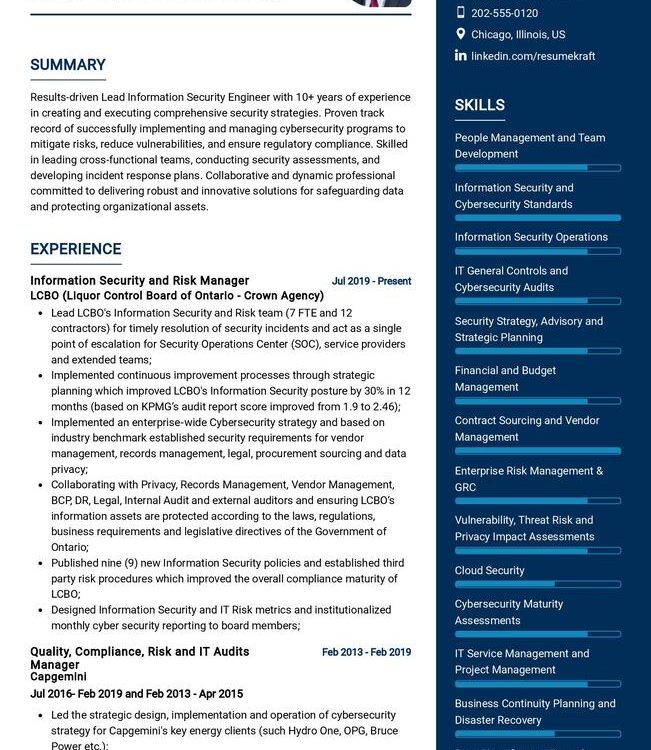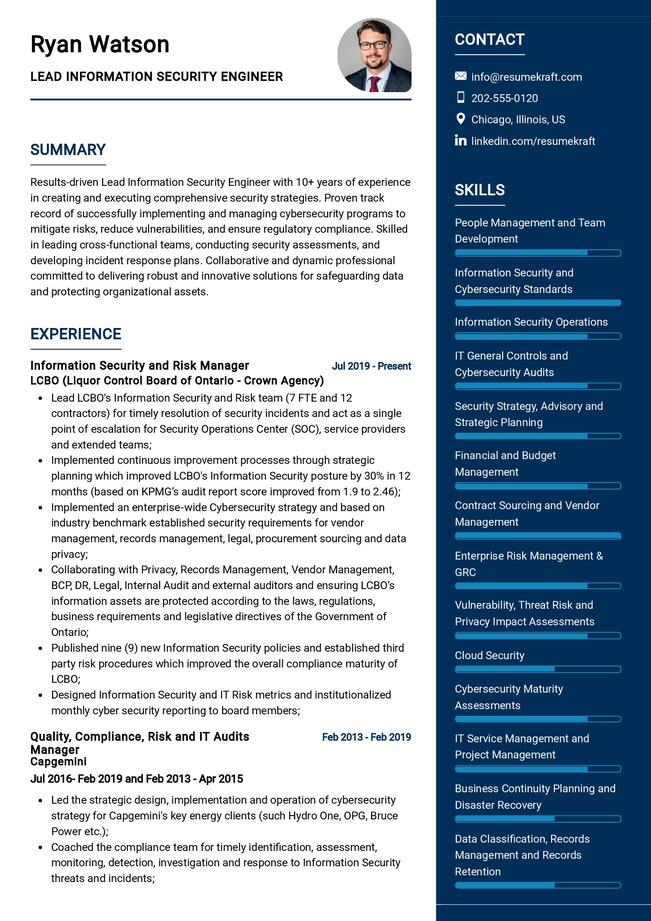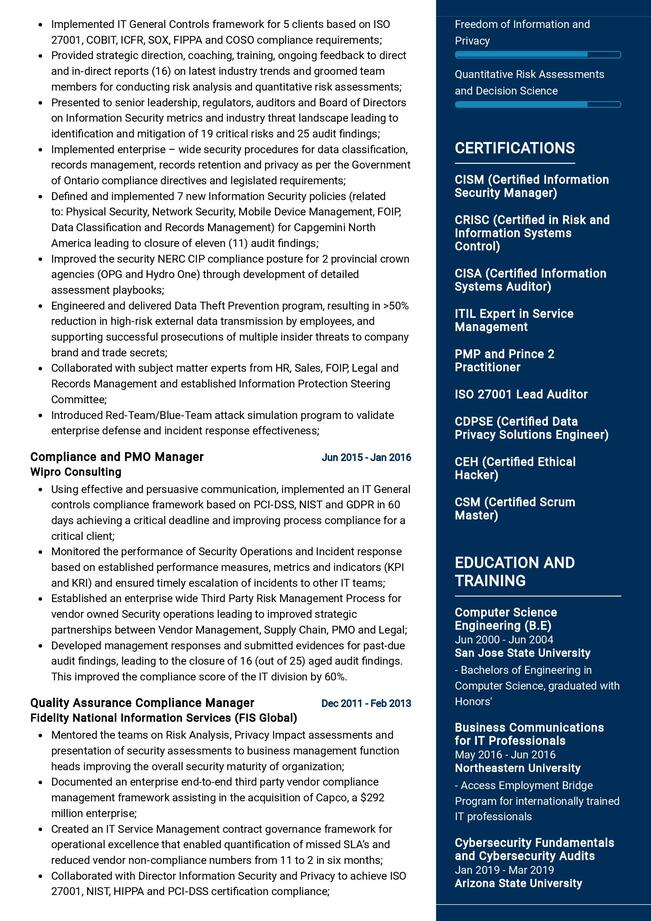Exploring the Role of a Lead Information Security Engineer
In an era where digital threats loom large, the role of a Lead Information Security Engineer has emerged as a linchpin in safeguarding organizations from cyber risks. This position demands a unique blend of technical prowess, strategic thinking, and leadership skills. Let’s delve into the multifaceted world of a Lead Information Security Engineer, a role pivotal in fortifying the digital fortresses of modern enterprises.
Key Responsibilities of a Lead Information Security Engineer
The responsibilities of a Lead Information Security Engineer go beyond conventional cybersecurity. This role involves orchestrating a comprehensive security strategy to protect an organization’s digital assets. Here are the key responsibilities that define this crucial position:
- Developing and implementing robust cybersecurity policies and procedures to mitigate risks.
- Leading incident response efforts, swiftly addressing and neutralizing cyber threats.
- Conducting regular security audits and vulnerability assessments to identify potential weaknesses.
- Collaborating with cross-functional teams to integrate security measures into the development lifecycle.
- Staying abreast of the latest cybersecurity trends and technologies to ensure proactive defense.
- Providing leadership and guidance to the information security team, fostering a culture of vigilance and continuous improvement.
- Ensuring compliance with industry regulations and standards to maintain the integrity of sensitive data.
Each responsibility requires a keen eye for detail, strategic thinking, and a proactive approach to stay one step ahead of cyber threats.
Qualifications and Skills Required
Becoming a Lead Information Security Engineer is a journey marked by continuous learning and a commitment to excellence. Here are the qualifications and skills that pave the way for success in this dynamic role:
- A Bachelor’s or Master’s degree in Cybersecurity, Information Technology, or a related field.
- Extensive experience in cybersecurity roles, demonstrating a progression of responsibilities.
- Deep technical knowledge of network security, encryption, firewalls, and intrusion detection/prevention systems.
- Proficiency in cybersecurity frameworks and standards, such as ISO 27001 and NIST.
- Leadership and managerial skills honed through experience and possibly through certifications.
- Excellent communication skills to convey complex security concepts to non-technical stakeholders.
- Certifications such as CISSP, CISM, or CEH to validate expertise in the field.
These qualifications, coupled with hands-on experience, form the bedrock of a successful career as a Lead Information Security Engineer.
Day in the Life of a Lead Information Security Engineer
Walking in the shoes of a Lead Information Security Engineer unveils a day filled with challenges, strategic decisions, and continuous learning. Here’s a glimpse into a typical day in this dynamic role:
- **Morning**: Reviewing overnight security alerts and incidents, prioritizing and assigning tasks to the security team.
- **Afternoon**: Conducting a meeting with the IT development team to ensure security measures are integrated into ongoing projects.
- **Evening**: Performing a thorough security audit, identifying vulnerabilities and proposing remediation strategies.
- **Night**: Being on-call for incident response, ready to address any emergent cybersecurity threats.
Adaptability, quick decision-making, and a passion for staying ahead in the ever-evolving cybersecurity landscape are the hallmarks of a day in the life of a Lead Information Security Engineer.
Crafting a Standout Lead Information Security Engineer CV
Your CV is the gateway to landing a Lead Information Security Engineer role. Here are tips to ensure your CV stands out in a competitive landscape:
- Highlight leadership roles, showcasing instances where you’ve led successful cybersecurity initiatives.
- Detail specific projects or programs you’ve spearheaded, emphasizing the impact on enhancing organizational security.
- Include metrics to quantify your achievements, such as percentage reduction in security incidents or successful implementation of security measures.
- List relevant certifications prominently to demonstrate your commitment to ongoing professional development.
- Personalize your CV for each application, aligning it with the specific requirements of the role.
Your CV is not just a document; it’s a narrative of your cybersecurity journey, a story of resilience, expertise, and leadership.
Lead Information Security Engineer CV Summary Examples
Your CV summary sets the tone for your cybersecurity narrative. Craft a powerful summary that encapsulates your experiences, skills, and the value you bring to the table:
- “Lead Information Security Engineer with a decade of experience, adept at developing and implementing robust cybersecurity strategies, resulting in a 30% reduction in security incidents.”
- “Seasoned cybersecurity professional with a proven track record in incident response, recognized for leading a rapid and effective resolution of critical security incidents.”
- “Strategic Lead Information Security Engineer specializing in vulnerability assessments and compliance, ensuring organizations meet and exceed industry security standards.”
Your CV summary is a snapshot of your cybersecurity journey, showcasing your expertise, achievements, and commitment to excellence.
Building the Experience Section of Your Lead Information Security Engineer CV
Your experience section narrates the chapters of your cybersecurity career. Here are examples to guide you in detailing your milestones:
- “Led a cross-functional cybersecurity team, implementing a threat intelligence program that resulted in a 50% faster response to cyber threats.”
- “Spearheaded the development and implementation of a company-wide cybersecurity awareness training, reducing the risk of internal security breaches.”
- “Managed the successful integration of a next-gen firewall system, enhancing the organization’s overall security posture.”
Each experience is a testament to your expertise, showcasing your ability to navigate the complexities of cybersecurity.
Educational Background for Your Lead Information Security Engineer CV
Your educational journey lays the foundation for your cybersecurity expertise. Here’s how you can list your educational milestones:
- Master of Science in Cybersecurity, XYZ University, a comprehensive program that deepened my understanding of advanced security concepts, 2015.
- Bachelor of Technology in Information Technology, ABC University, where I acquired the foundational knowledge that fueled my journey in cybersecurity, 2012.
- Certified Information Systems Security Professional (CISSP), validating my advanced knowledge and expertise in cybersecurity, 2017.
Each educational qualification is a stepping stone, contributing to your proficiency as a Lead Information Security Engineer.
Essential Skills for Your Lead Information Security Engineer CV
Your skill set is your toolkit in the cybersecurity domain. Here are the essential skills a Lead Information Security Engineer should possess:
Soft Skills:
- Leadership and team management, steering your team towards success in the dynamic cybersecurity landscape.
- Effective communication, conveying complex security concepts to both technical and non-technical stakeholders.
- Problem-solving abilities, essential for identifying and mitigating cybersecurity risks.
- Attention to detail, ensuring thorough security audits and assessments.
- Adaptability and resilience, crucial in responding swiftly to evolving cyber threats.
Hard Skills:
- Advanced knowledge of network security protocols, encryption, firewalls, and intrusion detection/prevention systems.
- Proficiency in cybersecurity frameworks and standards, ensuring compliance with industry regulations.
- Incident response and management, the ability to lead effectively in crisis situations.
- Vulnerability assessment and penetration testing, key skills in identifying and addressing security weaknesses.
- Security awareness training, fostering a culture of cybersecurity vigilance among employees.
Each skill is a tool, enabling you to fortify an organization’s cybersecurity defenses effectively.
Common Mistakes to Avoid When Writing a Lead Information Security Engineer CV
Avoiding common pitfalls is essential in crafting a compelling CV. Here are mistakes to steer clear of:
- Using a generic CV for multiple applications, failing to highlight your unique fit for each role.
- Focusing solely on job duties, missing the opportunity to showcase your specific achievements and contributions.
- Neglecting the importance of a cover letter, a valuable tool to convey your story and connect with potential employers.
- Overloading your CV with technical jargon, potentially obscuring your true value to non-technical readers.
- Skipping the proofreading process, as errors can leave a lasting negative impression on prospective employers.
Avoid these mistakes to ensure your CV stands out as a testament to your unique expertise and accomplishments.
Key Takeaways for Your Lead Information Security Engineer CV
As we conclude this comprehensive guide to crafting a standout Lead Information Security Engineer CV, remember these key takeaways:
- Emphasize leadership experiences, showcasing your ability to steer cybersecurity initiatives to success.
- Highlight your technical proficiency, demonstrating expertise in key cybersecurity domains.
- Detail strategic initiatives you’ve led, painting a picture of your visionary approach to cybersecurity.
- Include a section on continuous learning, showcasing certifications and courses that validate your commitment to staying at the forefront of cybersecurity.
Your CV is more than a document; it’s a canvas where you paint your cybersecurity story — a story of growth, resilience, and leadership. Best of luck in your journey as a Lead Information Security Engineer!
Finally, feel free to utilize resources like AI CV Builder, CV Design, CV Samples, CV Examples, CV Skills, CV Help, CV Synonyms, and Job Responsibilities to create a standout application and prepare for the Lead Information Security Engineer job interview.



